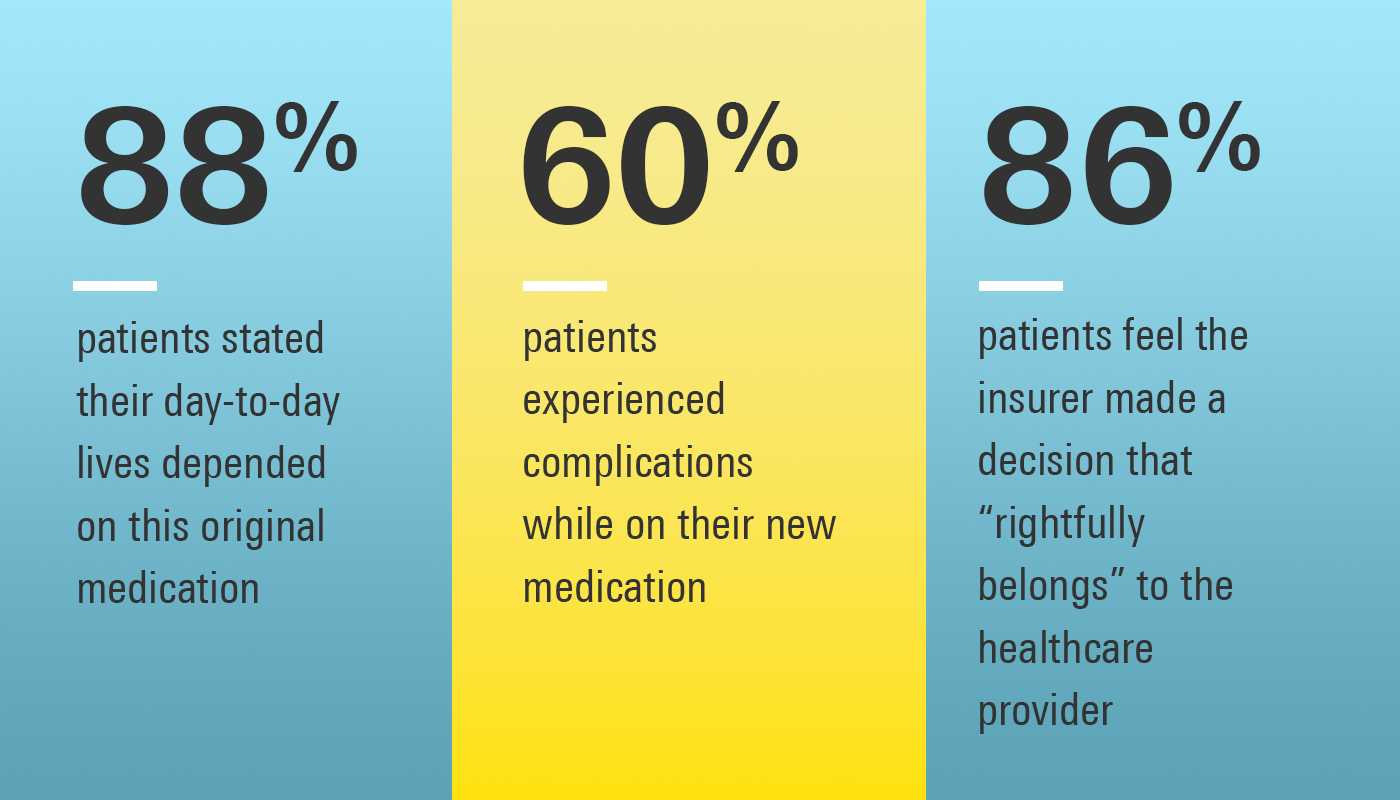Educate Yourself on Non-Medical Switching
Non-medical switching is the term used when insurance companies force a patient to switch medications for non-medical reasons without regard for the patient’s medical needs or their healthcare provider’s recommendations.
These switches are not usually related to the occurrence of side effects or a lack of clinical efficacy or poor adherence, but rather are frequently an attempt to reduce the amount of money insurance companies need to spend on medications in order to maximize their profits.
These switches usually occur through a formulary change which removes a medication from a patient’s insurance coverage; however, insurance companies may also make patients feel forced to switch medications by adding additional steps to getting medications approved (called prior authorizations), increasing their out-of-pocket costs through the use of a higher co-pay, or by reducing the percentage that their insurance plan will cover.
Effects on patients
If a medication is working, why should we switch it? It’s a valid argument. Non-medical switching can have a very negative impact on a patient; not just on their health, but also on their adherence to their medication. Some examples of problems it can create include:
- Switching to less effective medications: Sometimes the new medication the patient is being switched to is not as effective at treating their disease.
- More doctor visits: Switching medications forces a patient to re-start the process of working with their healthcare provider to find another medication that works for them in controlling their disease. Increased doctor visits usually result in additional costs to the patient.
- New medications mean new medication risks: Switching medications from one that works to something different can increase the possibility of side effects for that patient and may cause them to “move backward” in their disease treatment. For many patients, especially ones with chronic diseases such as diabetes, finding the specific medication that helps control their disease with minimal side effects can take months or even years.
- Stop taking the medication: Some patients eventually get tired of the insurance headaches, expensive costs, and unnecessary doctor visits and just stop taking their medication. Depending on the medication they were taking this could cause serious problems down the line.
These are just some of the many issues that can arise. In a worst-case scenario, serious adverse events may occur or the patient loses control of their disease which ultimately send them to the emergency room to help get their disease back under control.
Effects on healthcare providers
Physicians and other prescribers devote a lot of time and care to each patient to ensure they find a medication that works for them, especially for patients with chronic conditions. A switch at the pharmacy can be extremely frustrating and problematic for the prescriber as there is a potential to create problems around managing the medication switch in general, loss of disease control for the patient (possibly causing disease regression) and an increase in potential side effects that will have to be managed as well. Finally, while these automatic medication changes are normally communicated to the healthcare provider, in reality this does not always happen. This means that while they believe their patient’s health is being managed appropriately, in reality it may not be.
Pharmacists are also highly affected by non-medical switching. After a medication’s coverage changes, the pharmacist spends a lot of time communicating with patients, physicians, and payers to discuss these changes and educate them all on how this can affect them; this often makes them the middlemen in these changes even though they do not get a say in the medication switching. Recently, a physician in Colorado, Dr. Kari Uusinarkaus, spoke out about how non-medical switching has severely affected one of his patients. A quote from the article posted in The Gazette states that “non-medical switching is a dangerous, counterproductive strategy that puts profits squarely ahead of patient health.”
How patients feel
A national poll of 800 patients affected by non-medical switching was performed by Alliance for Patient Access called “A study of the qualitative impact of non-medical switching”, which aimed to gain some insight into patient experiences.

When patients were asked about the value of getting their medications right, around 60% had reported that it was difficult to find the medication that worked for them, and 88% stated that their day-to-day lives depended on this original medication. Most patients reported that their insurance company stopped covering the medication they were on and they only found out about it at the pharmacy counter when they went to go and fill their prescriptions.
Nearly 60% of these patients experienced some form of complication while on their new medication, with approximately 1 in 10 people being hospitalized.
The impact of non-medical switching on other aspects of these patients lives (such as their family and work life) were also reported. Between 40-50% of respondents said that the switch in medication impacted their productivity at work and affected their family relationships. This took a toll on a lot of patients’ emotional well-being with 72% reporting a feeling of helplessness.
An overwhelming 86% of respondents claimed that the insurer made a decision that “rightfully belongs” to the healthcare provider and over 90% believe that these decisions should be solely made by the patient and healthcare provider and laws should be put in place to reflect such an arrangement.
Conclusion
Healthcare decisions should be made exclusively by healthcare providers and patients working together to determine the best treatment plan, not by insurance companies trying to save money. Medication switching solely to reduce drug cost can result in increased overall healthcare usage and costs for the patient.
This is why at Marley Drug; we only give you the medication your healthcare provider prescribes. By not using insurance and paying cash, we can offer you a great price on your medications and you do not have to worry about non-medical switching being forced by your insurance company.